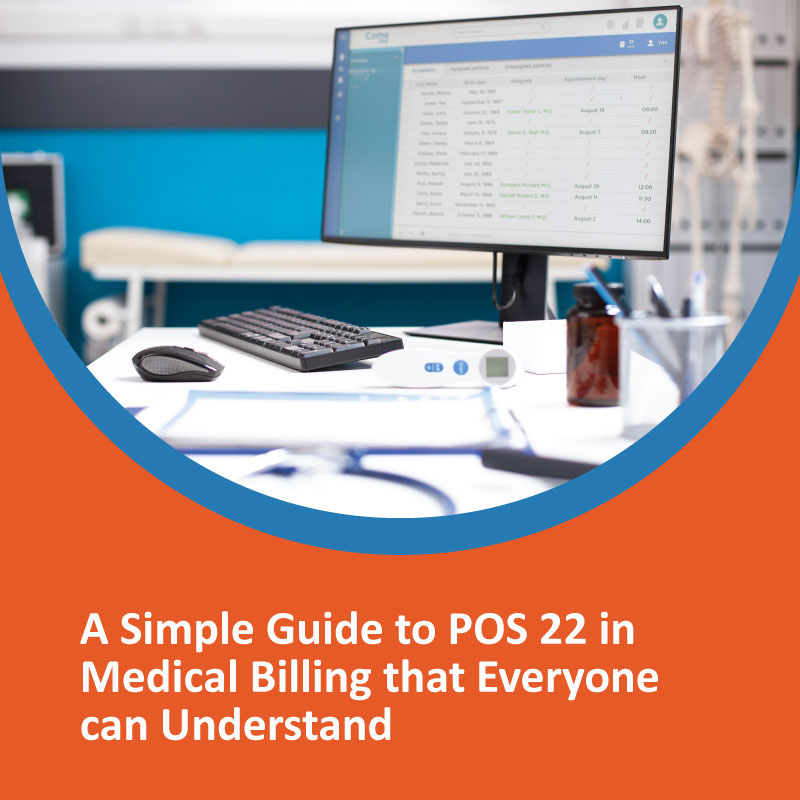When it comes to medical Billing, there are a lot of codes, like pos 22 in medical billing, terms, and paperwork to deal with. It can make it difficult to understand at first. You might have seen something like “POS” followed by a number on a medical bill or claim. These numbers are called Place of Service (POS) codes. Each one tells insurance companies where a patient had treatment.
This blog is all related to POS 22. What it means, why it is significant, and how it changes bills. We will explain everything about POS 22 in simple, easy language, even if you are not a Billing specialist.
What does “POS” signify in medical Billing?
Before we get into POS 22, let’s talk about what POS means.
POS stands for Place of Service. This two-digit code is used on medical claims to show where the patient had treatment. It helps insurance companies process claims correctly and decide how much to pay or give back.
For example:
- POS 11 means that the service took place at a doctor’s office.
- POS 21 is a hospital where you spent the night.
- POS 02 is for health services over the phone.
The insurance company uses each code to figure out where the care took place, which affects how much they pay the provider.
What does pos 22 in medical billing mean?
POS 22 is used when a medical treatment is given in a “On-Campus Outpatient Hospital.”
Let’s break that down:
- On-Campus: This signifies that the place is either inside the main hospital building or very close to it.
- Outpatient means that the patient did not stay in the hospital. They went home the same day after getting treatment or having a procedure.
- Hospital: The services were given at a hospital, but the person was not staying there.
POS 22 means that the patient got care outside of the hospital, but not at another clinic or through telemedicine. They obtained care within or very close to the main hospital instead.
POS 22 in real life
Here are some examples to help make things clearer:
Imaging for diagnosis: A patient goes to the hospital’s radiology department to get an X-ray. They don’t stay once the procedure is over. This is POS 22.
Chemotherapy: A cancer patient takes chemotherapy at an outpatient clinic in a hospital. The patient goes home after a few hours of treatment. This would also be POS 22.
Visits from experts: Some hospitals have doctors who are experts in various fields who work in the hospital. If the patient visits this kind of doctor and doesn’t get admitted, this is a POS 22 situation.
What makes POS 22 so important?
Why do we need these codes? Does it matter if the service was on campus or off campus?
This is why POS 22 is important:
- Rates for Reimbursement
The amount that insurance companies pay changes based on where the service is provided. Services done in a hospital usually cost more than those done in a private office or a separate clinic. POS 22 tells the insurance company that the patient went to the outpatient department of a hospital for care. This usually means increased overhead costs, which could require larger payments to the supplier.
- Following the Rules and Audits
For compliance, it is essential to use the right POS code. A service might get paid less than they should if they use POS 11 (office) instead of POS 22. This could mean fines, checks, or claims being turned down.
- Paying for Care Together
Patients may also have to pay different amounts depending on where they seek care. Some insurance plans charge more for outpatient services that are done in a hospital, such as co-pays or coinsurance. So, POS 22 can modify the amount of money a patient has to pay out of their pocket.
Common Mistakes People Make About POS 22
Sometimes, even experienced billers mix up POS 22 with POS 19. Both are about outpatient care in hospitals, but here’s the main difference:
- POS 22: On-Campus Outpatient Hospital: The care was given on the hospital’s main campus or quite close to it.
- POS 19: Off-Campus Outpatient Hospital: The care was given at a hospital-owned site that wasn’t on campus.
For instance, POS 19 would be an outpatient clinic that is part of the hospital system but is 10 miles away.
POS 22 is a lab or outpatient surgery clinic that is directly connected to the hospital.
When to Use POS 22
Here are some tips to help you decide when to use POS 22 if you work in medical Billing or claims management:
- Talk to the Provider: Always check where the work was done.
- Look at the Address: Compare the service address to the primary address of the hospital. If it’s the same or close by, it counts as being on campus.
- Check out the CMS Guidelines: The Centers for Medicare & Medicaid Services (CMS) has clear standards concerning what “on-campus” entails. CMS explains that “on-campus” usually means being within 250 yards of the hospital’s main buildings.
- Keep up to date: The rules may change. Always ask your insurance company and CMS if there are any new restrictions about Billing and compliance.
Things to Stay Away From When You Use POS 22
You could get in trouble if you use the wrong POS code. Here are some frequent blunders to stay away from:
- Mixing up POS 11 and POS 22: These two are very different from each other. POS 11 is for private medical offices, which usually get paid less. You might not have to follow the requirements or make as many payments if you utilize POS 11 instead of 22.
- Using POS 22 for telehealth: That’s not correct. If the patient is in a particular place throughout the chat, you should use POS 02 or 10 for virtual services.
- Mistakes in Billing for sites that aren’t on campus: If a service is done in a hospital-owned building that isn’t on campus, use POS 19 instead of 22.
Conclusion
POS 22 is one of many small things that can have a big effect on medical billing. Everyone gets paid the right amount, including doctors, hospitals, insurance companies, and patients, if they know what it means and how to use it properly. POS 22 basically says that the hospital site has services for people who aren’t patients. It is used when someone needs hospital care but doesn’t need to stay overnight. The amount of money that people and insurance companies pay doctors has changed. You can legally bill, get paid, and handle cases quickly and easily when you use the right POS code. The healthcare system is difficult, but knowing POS 22 can help you feel more at ease, whether you work in billing, are a doctor, or are just a patient who wants to learn more.



